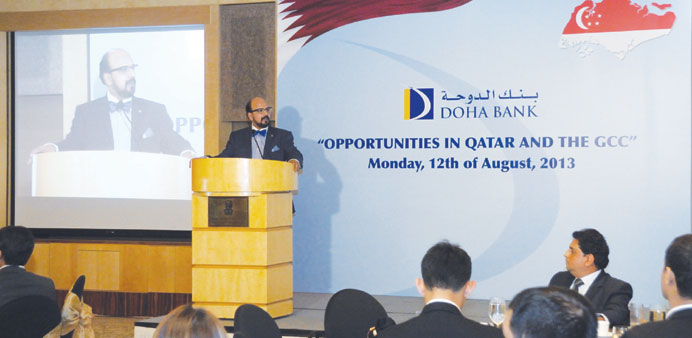Qatar and Singapore have explored various “synergistic opportunities” in recent years resulting in surge in bilateral trade and development, according to Doha Bank Group CEO R Seetharaman.
Highlighting that Qatar is Singapore‘s 21st largest trading partner with total trade at S$9.8bn, he said bilateral trade has increased by more than 26% during 2010-12 mainly on account on increase in exports by Qatar.
“Singapore has emerged as a strategically important hub for Qatar’s LNG exports to the region,” Seetharaman said at a recent knowledge sharing session hosted by the bank on “Opportunities in Qatar and the GCC (Gulf Co-operation Council)” at Ritz Carlton, Singapore.
Key officials from Qatar Embassy, Monetary Authority of Singapore (MAS), Ministry of Trade and Industry, International Enterprise, Singapore Business Federation and Singapore Indian Chamber of Commerce participated in the event.
Seetharaman’s comments come at a time when Qatar and Singapore are to engage in a high level joint committee meeting this November at Singapore to enhance the existing bilateral partnerships and explore new areas of co-operation.
Singapore LNG Corp has already received its first ever cargo of LNG from Qatargas at its terminal on Jurong Island. Keppel Group has a joint venture tie up with Nakilat, which has announced its plans to build 25 vessels per year. Keppel Seghers, the environmental technology arm of Keppel Group, Singapore has worked on Doha North Sewage Treatment Works plant.
Highlighting the bilateral trade developments between GCC and Singapore, Seetharaman said GCC–Singapore trade has surged from S$43.6bn in 2010 to S$68.5bn in 2012.
Exports to Singapore by the GCC has increased from S$36.5bn in 2010 to more than S$60bn in 2012; while imports from Singapore by the GCC has increased from more than S$7bn in 2010 to about S$8.5bn in 2012.
The UAE is Singapore‘s 12th largest trade partner with total trade amounting to S$25.5bn, followed by Saudi Arabia with a total trade of 23bn.
The free trade agreement between Singapore and the GCC was signed in Doha in 2008. While it was endorsed by the UAE, Qatar and Oman; it must be ratified by Saudi Arabia, Kuwait and Bahrain. It is expected to be endorsed by all the GCC members, Seetharaman said.
Giving his outlook on Singapore economy, Seetharaman said it depends on foreign trade both from port activities and from exports of electronic components and refined oil.
Observing that the economy had grown 3.7% during the second quarter against 0.2% in the preceding quarter, he said there was expansion in economy mainly due to rebound in manufacturing.
The MAS has kept economic growth forecast of between 1% and 3% for this year and has lowered its inflation forecast for this year to 2%-3%. Loan growth in Singapore’s banking system was close to 10% in the first six months of this year with trade finance and manufacturing being key contributors, Seetharaman said.
However, the MAS is concerned about the rising household debt in Singapore, he said, adding the authority fine-tuned rules on housing loan-to-value (LTV) limits in June this year to prevent circumvention of tighter LTV limit on second and subsequent housing loans and introduced a 60% total debt servicing ratio cap.
Quoting IMF World Economic Outlook update, Seetharaman said global growth would be 3.1% this year; it has been marginally revised downwards in the developed economies such as the US and the euro region.

